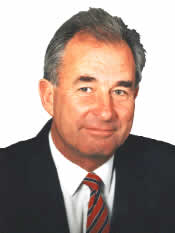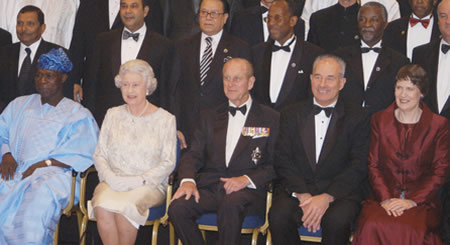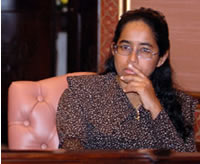 Editorial
Editorial

The Right Honourable Mr. Don McKinnon. Secretary
General of the Commonwealth and our Deputy Prime
Minister in a National Party Government
|
Who initiated reform?
July 2004
There is a general feeling among Maldivians,
partly as a result of a regime-driven propaganda campaign,
that the current process of constitutional reform in the
Maldives is the result of a home-grown initiative of the
head of the regime. There are others who feel that it may
have something to do with the shooting of prisoners by the
regime or the outcome of political pressure from an overseas-based
opposition group.
Investigations by this website have revealed that the current
constitutional reforms were initiated as a result of direct
pressure from the Commonwealth, the Secretary General of
which is New Zealand's former Deputy Prime Minister the
Right Honourable Mr. Don McKinnon. Those reforms are directly
related to sections 7, 8 and 9 of the Abuja Communiqué
(copied below in the inset) agreed to by the Commonwealth
member states in December 2003 after months of deliberations
by officials.
This Communiqué refers to fundamental political values
the Commonwealth seeks to implement in member states that
will promote democracy, eliminate all forms of corruption,
stop human rights violation and police brutality, prevent
misuse of public funds and international aid, and to bring
to an end organised crime such as terrorism, money laundering
and drug trafficking.
Countries within the Commonwealth that do not comply with
the maxims of this Communique could face suspension and
economic sanctions from the organisation. There is too much
foreign aid at stake to allow this to happen.
In this Age of Information, any attempt at claiming that
current constitutional reforms in the Maldives are the result
of the magnanimity of the current regime is a dishonest
exercise that will end in futility. Such an attempt would
also be a breach of the fundamental political values agreed
to in Abuja.
Extract from
the Abuja Communiqué
Fundamental Political
Values (emphasis
added)
- Heads of Government reaffirmed their
commitment to the fundamental political values
of the Commonwealth as set out in the Singapore
and Harare Declarations and subsequent CHOGM Communiqués,
and reinforced by the Millbrook Action Programme.
They reiterated their commitment to non-racism,
international peace and security, democracy,
good governance, human
rights, rule of law,
the independence of the judiciary,
freedom of expression, and a
political culture that promotes transparency,
accountability and economic development.
- Heads of Government endorsed the recommendations
of their Law Ministers on Commonwealth Principles
on the accountability of and relationship
between the three branches of Government.
They acknowledged that judicial independence
and delivery of efficient justice services were
important for maintaining the balance of power
between the Executive, Legislature and Judiciary.
- Heads of Government expressed their full support
for the good offices role of the Secretary-General
in conflict prevention and resolution, and post-conflict
reconstruction and development. They also expressed
their continuing support for the Commonwealth
Secretariat's work for strengthening democratic
institutions, processes and culture.
They acknowledged the value of election observation,
provision of technical assistance and training
and other activities. They welcomed the Secretariat’s
collaboration with the Commonwealth Parliamentary
Association, the Commonwealth Local Government
Forum and other relevant organizations to promote
best democratic practice.

The Commonwealth Heads of Government Meeting in
Abuja, Tanzania 2003.
From second on the left (seated) are Her Majesty
Elizabeth II, Queen of New Zealand and Head of
the Commonwealth; His Royal Highness the Prince
Phillip, Duke of Edinburgh; the Right Honourable
Mr Don McKinnon, Secretary General of the Commonwealth
and New Zealand's former Deputy Prime Minister
and the Right Honourable Miss Helen Clark, M.P.,
Prime Minister of New Zealand
Standing on the far
left is the Maldive regime's delegate, Fathullah
Jameel Abdulla.
|
Rule of Law
One of the many fundamental political
values noted in the Abuja Communiqué is the "Rule
of Law". It is important to comment on this concept
as it is a concept that is much misunderstood by educated
Maldivians of all levels and persuasions. There seems to
be a belief that the Rule of Law means compliance with legislation,
edicts, proclamations, regulations, administrative precedents
and political practice. Given that definition (if considered
to be correct), the Ayatollah Khomeini, Adolf Hitler, Saddam
Hussein and Mullah Mohamed Omar would have claimed to have
governed under the Rule of Law.
The Rule of Law is a complex legal concept
that evolved in Common Law jurisdictions such as England
and Wales, Scotland, New Zealand, Australia and Canada over
many centuries. The following is an extract from a publication
by the New Zealand Ministry of Justice that briefly outlines
what the Rule of Law means.
The Rule of
Law
The
rule of law also forms a significant part of the New
Zealand constitution. The principles of the rule of
law are not easily defined, but encompass ideas such
as:
-
the
powers exercised by parliamentarians and officials
are based on legal authority;
-
there
are minimum standards of justice to which the
law must conform, eg laws affecting individual
liberty should be reasonably certain and clear;
-
the
law should have safeguards against the abuse of
wide discretionary powers;
-
unfair
discrimination should not be allowed by the law;
-
a
person should not be deprived of his or her liberty,
status or other substantial interest without the
opportunity of a fair hearing before an impartial
court or tribunal.
|
New Zealand, as a responsible global
citizen, takes an active role in promoting the "Rule
of Law" internationally. Click
here to read New Zealand's role in promoting the Rule of
Law in the world: Statement by our Permanent Representative,
Mr Don MacKay at the United Nations Security Council (30
September 2003)
Good Governance
Another important political value referred
to in the Abuja Communiqué is “Good Governance”.
The New Zealand Government runs a global programme to promote
good governance, through the promotion and protection of
human rights, participatory development, and peace and social
stability, at regional, national and local levels.
It
is not known why one of the officials who came
to be trained by us under the Good Governance
Programme- Global attended three times. |
|
To this end the New Zealand Government
has hosted and trained several high-ranking officials of
the Maldive regime. A person by the name of Mohamed Hussain
attended three times and a certain Asim and one Abdulla
Shahid Jameel attended once each. These officials are based
at the Maldive regime's office of the president of the republic.
The New Zealand Government, along with those of the United
Kingdom and Australia provide significant amounts of assistance
to the Maldives through taxpayer-funded aid programmes.
New Zealand taxpayers have a right to find out whether or
not these funds are misused. It is hoped that New Zealand
tax dollars spent on these individuals have not gone to
waste. (Click
here for an article published in another website in 2001
titled How the Maldives Misuses International Aid and
Assistance)
The current constitution failed
Surprisingly, it took 17 years and millions
of dollars in local funding and foreign aid to draft the
current Maldive constitution. It has taken barely seven
years to make this “structure built on loose sand”
totally obsolete as
predicted in this website nearly 3 years ago.
Someone has to take responsibility for this mammoth failure.
The least that the current lawmakers could do is to make
note of the gross legislative negligence that resulted in
this fiasco in the preamble to the new constitution.
Will the proposed reforms succeed?
Our team of legal experts have reviewed
the proposed reforms to the Maldive republican constitution
(click
here to view). They have highlighted the following
examples in particular, amongst many other issues, as areas
of concern and why they believe any amended constitution
will probably fail to deliver the maxims of the Abuja Communiqué.
They are:
The question is will
the proposed reforms succeed, and will they deliver the
maxims of the Abuja Communiqué? Judge for yourself
!
Our
woman in Malé

Faathin Hameed
She is
a non-elected presidential member of the People's
Special Council charged with reforming the Maldive
constitution. A niece of the head of the Maldive regime,
Hameed is a daughter of the most powerful official
in the regime who is also speaker of parliament.
A beneficiary of New Zealand's generous bilateral
aid programme, Hameed was educated at the University
of Waikato in Hamilton where she completed her undergraduate,
graduate, doctoral and post-doctoral studies.
Hameed was an occasional overnight guest at the family
home of this author in New Plymouth. As a student
she was an intelligent and sensible woman with an
independent mind, in spite of her shady family ties.
As she discharges her new role as lawmaker, it is
hoped that Hameed would provide good returns to the
intellectual investment funded out of our taxes, and
delivers on the side of decency that New Zealand has
instilled in her. |

